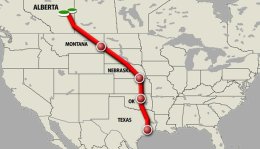 With President Obama’s veto of the Keystone XL pipeline bill last week, it’s likely that the Canadian-US oil agreement will be stalled out for now. On Wednesday, the Senate will vote to override the president’s veto, but it will be a very close call.
With President Obama’s veto of the Keystone XL pipeline bill last week, it’s likely that the Canadian-US oil agreement will be stalled out for now. On Wednesday, the Senate will vote to override the president’s veto, but it will be a very close call.
The Keystone XL pipeline has been a battleground for environmental groups, the Canadian government and oil companies, Republican leaders in the House and Senate, and the US State Department for the past six years. In his written statement, Obama said that because the bill “cuts short thorough consideration of issues that could bear on our national interest — including our security, safety, and environment – it has earned my veto.”
So, what are those issues that could bear on national interest?
- Economics: House speaker John Boehner (R-Ohio) thinks it’s a “no-brainer” and a national embarrassment that countries like Russia and China are moving ahead on massive pipelines, but the US can’t get the project off the ground. “The president is just too close to environmental extremists to stand up for America’s workers,” Boehner said in a statement. Supporters of the pipeline say that it would create construction jobs, reduce oil prices, and help grow the economy.
- Environmental issues: Sierra Club Executive Director Michael Brune says that the president has all the evidence he needs to reject the Keystone pipeline for now – it may contribute significantly to the climate crisis, and Republicans are too tied into their big oil allies. Other Keystone opponents argue that it would accelerate climate change, it could pollute waterways along the pipeline’s route, and won’t be contributing very much to the US economy.
- State Department: White House Press Secretary Josh Earnest told media that one of the reasons the president vetoed the bill is that the US State Department is still conducting a review of the massive pipeline that would be moving about 800,000 barrels of crude oil per day from Alberta to oil refineries in Port Arthur, Texas. Secretary of State John Kerry has been getting a great deal of pressure to give the green light to the pipeline, but the review process has been dragged out. The State Department had asked federal agencies for feedback on the $8 billion pipeline project, and hasn’t been clear about when its official statement will be released.
- US and Canada relations: The Canadian government and oil industry need to have Alberta tar sands processed in Texas and then distributed to oil refineries in the US and Canada. Canadian officials have expressed frustration with the decision, and suggest that it could set a bad precedent for bilateral trade agreements between the US and Canada.
- Too much gray area: Some of the Keystone opposition arguments come from concern that the facts may be distorted, and that investing $8 billion in the pipeline may not be worth it. While up to 42,000 jobs could be created, these are temporary construction jobs lasting one-to-two years; only about 50 full-time jobs such as pipeline inspectors would be put into place. There’s also the fact that plenty of oil and gas are being extracted from shale fields through hydraulic fracturing; and there’s so much global oil supply out there that oil prices – and gasoline – will stay low for the foreseeable future.



